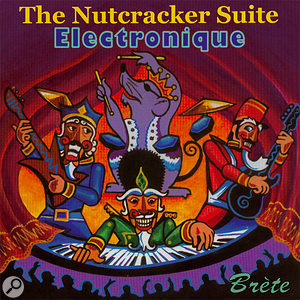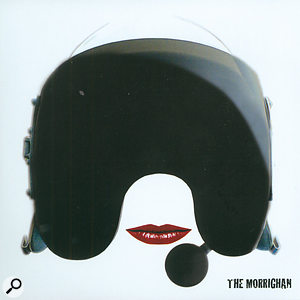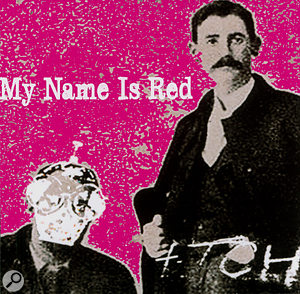More of your submissions get the once-over by the SOS editorial staff.
CD Of The Month: Vendetta Tyranny Of Minority
Big–name metal bands rarely stay on form for the duration of their careers. In almost every case, there comes a moment in their history where they’ve produced the best material they ever will, and are destined to churn out crap, unmemorable albums for as long as they can bear to be in the same room as each other. Take Metallica, for example: ...And Justice For All marked their turning point; for Sepultura, it was when Max Cavalera left; and for Pantera, it was Far Beyond Driven.
But while the has–beens of metal are busy taking computer geeks to court or (tragically) getting shot on stage, the genre seems to have taken a turn for the worse. The guitar solos have gone, the production is over–polished, and the music videos are looking more and more like they belong on MTV Base.
Enter Vendetta, whose goal, it seems, is to pick up where their childhood heroes left off, and deliver “an album of classic metal anthems.” And that is exactly what they’ve done. From the archetypal harmonised guitar riffs and solos to the Mustaine–esque wailing vocals, what they lack in innovation (which is to say, there is none), they make up for in technical ability, and the lost art of playing as many coherent notes per second as is physically possible.
The recording and production follow the same line — the snare has that ’80s snappiness that fans of Megadeth will instantly recognise, and the bass and kick drum sit together well, despite both having a fair amount of presence. Similarly, the numerous layered guitar parts could have ended up as a disastrous mush of lower mids, but panning and EQ have been used well to give the album a good sense of space.
If there’s anything fundamentally wrong with Tyranny Of Minority, it’s that Vendetta missed the heavy metal boat by about 20 years. Were it not for those two little decades, there’s no doubt in my mind that, right now, they’d be embarking on their 18th world tour (entitled Vendetta: Live After Death or something equally apt), while their team of lawyers tries to figure out which tax haven to base Vendetta Enterprises on, in order to save a further million pounds a year. This being the 21st Century, however, I fear that the most lucrative use of their talents would be to form the world’s greatest Iron Maiden covers band. Chris Korff
The Morrighan One Hour On Earth
Somewhere below the radar of major record labels is the world of ‘festival bands’: groups who might not wear this year’s skinny ties or play this year’s blend of shoegazeing indie with nu–rave beats, but know a whole lot about making hippies dance. And if the Morrighan’s album is anything to go by, I suspect they spend a fair chunk of every summer in a camper van. Their brand of anthemic ‘dance music made with proper instruments’ is unlikely ever to become fashionable, but it has an obvious crowd–pleasing quality that could become irresistible should you find yourself sharing a field with crusties.
Production–wise, you couldn’t accuse them of being innovative or even particularly contemporary, but master Morrighaneer Jon–X pulls off most of the classic dance tricks with aplomb. The album is littered with snippets of sci–fi dialogue, breathy vocals, panning delays, vocoded phrases and larger–than–life piano riffs, and though there are plenty of big sounds (and even bigger reverbs) on display, they’re never allowed to fight or become cluttered. Cecily Fay’s vocals recall Kate Bush in places, but her lyrics plough some very well–worn furrows, alternating bland New Ageisms with political platitudes that won’t bring down the Bush administration any time soon. It isn’t my cup of tea, but to be fair it probably makes a lot more sense in a giant wigwam in Wiltshire than it does on headphones in the SOS office. Sam Inglis
Matt McGinn Double Bed And Other Wee Tunes
A lot of people seem to double–track almost everything they record as a matter of course, in the conviction that this will somehow make it sound more impressive. I dare say this works on some instruments, but, as Matt McGinn should probably have realised, slide guitar is not one of them. It’s one of several questionable engineering and production choices on his EP, none of them as off–putting as its hideously twee title. He often pans his instruments in such a way that the mix as a whole sounds lopsided, especially on the title track, while over–use of compression somewhere along the line means that the drums disappear when the backing vocals come in, and the vocal sound seldom does justice to Matt’s powerful singing.
Despite everything, though, what this EP demonstrates is that even when they’re not recorded very well, real instruments still have the power to engage the listener in a way that the most perfect MIDI tracks can’t. And although all four tunes are at least a minute too long, they show that Matt McGinn has promise as a songwriter, with influences ranging from the Beatles to John Martyn. Sam Inglis
www.myspace.com/mattthemusicman
Br te The Nutcracker Suite Electronique
Few, if any, of the CDs that I have reviewed in this column have called into question the producer’s sanity as much as Br te’s unique interpretation of the Nutcracker Suite. His goal, if I am to assume he achieved it (and I sincerely hope that he did), can only have been to reduce Tchaikovsky’s most revered collection of works to a cacophony of tasteless electronica.
Giving him the benefit of the doubt, then, I have to congratulate him on the choice of sounds used to recreate these masterpieces. His use of tawdry, grating keyboard patches (coming, I suspect, from a rather old sound module selected specifically for its ‘elevator music circa 1988’ sound) is commendable, and enough to make you wonder why traditional orchestras continue to exist long after the advent of the wavetable synthesizer.
Likewise, the decision to incorporate electro beats played by General MIDI–style drums, particularly on his house version of ‘Dance Of The Sugar Plum Fairy’, was a stroke of genius. To compare like with like, Picasso once said: “It took me four years to paint like Raphael, but a lifetime to paint like a child.” So, too, must Br te have spent years unlearning the rules that inhibited his creativity, and perfecting the art of programming drums with all the musical flair of a primate.
Sadly, I suspect that most people will be too stuck in their ways to recognise Br te’s genius. Often, when such a unique, groundbreaking work is presented to the world, it is met only with disgust and contempt. I can imagine The Nutcracker Suite Electronique provoking just such a reaction Chris Korff
Fade demo
My memory seems to be going. I have no recollection of seeking out the music of Fade, but apparently, I “requested” a copy of their demo. Mind you, the letter that comes with it also asserts that “Fade don’t have influences, as influences suggest you sound like someone. Fade sound like Fade”, before enthusiastically quoting a review that compares them to Space. I suspect this is a band who will win more friends, and be taken more seriously, if they turn down the dial on the hype machine a few notches.
At four minutes 23 seconds, Fade’s demo is almost so short as to feel like a waste of a CD, but when you’re faced with a mountain of Jiffy bags to plough through, that can only be a good thing. However, they certainly do have influences, and they certainly do sound like someone. Specifically, they sound like those mid–’90s Britpop bands who doffed their caps to old–time music hall, like David Devant and his Spirit Wife. As a result, their music is jolly enough, but not really the sort of thing you’d want to listen to more than once. It would be infinitely more interesting if they ever broke out of two–guitars–bass–and–drums mode to employ some more adventurous instrumentation. Sam Inglis
Dan Coffey Themes 1-50
One of the charms of hearing SOS readers’ output is that you are forcibly reminded of what a broad church the music world is. Whenever the weight of ‘me too’ indie bands and uninspired electronica threatens to become too heavy, you’ll pick out a CD like Dan Coffey’s utterly uncategorisable album. It contains 50 mostly instrumental tracks, each roughly a minute in length, and numbered from one to 50. They were, says Dan, recorded using mostly home-made samples, plus some sounds from Reason. And they are, well, unique. Some have a Michael Nymanesque quality, while others suggest influences as diverse as drum & bass, TV game-show themes and French pop music.
The work Dan has put into making his own samples has been very worthwhile, but it’s a shame he seems to have relied on the built-in Reason sounds for his drum programming. The rhythm tracks often sound clumsy and repetitive by comparison with the melodic and textural elements, and in general, this struck me as a CD which worked better in its quieter moments. Sam Inglis
My Name Is Red demo
My Name Is Red describe their music as “filthy electro punk for your filthy soul”, but there’s precious little electro on display, and their filthy punkiness amounts to using a tedious telephone vocal effect throughout. In fact, you could sum up their whole production ethos by saying that they really, really want to sound like the Killers. At this, they succeed tolerably well, but tying themselves to this particular bandwagon is surely stifling their potential. Their singer, especially, has a characterful voice and a sharp lyrical mind, which are in danger of going to waste here. Sam Inglis
Playback Is Sponsored By Line 6
 The best CD reviewed each month will win a Line 6 Toneport UX1 recording interface, plus the complete set of expansion model packs and the Gearbox Plug-in feature, giving the winners a comprehensive range of amp and effects combinations to use with their computer recording system. Toneport includes meticulously crafted models of premium tube studio preamps, vintage guitar and bass rigs, and sought-after, personality-rich effects, while the Gearbox software provides complete control over your sound, with a unique low-latency monitoring option.
The best CD reviewed each month will win a Line 6 Toneport UX1 recording interface, plus the complete set of expansion model packs and the Gearbox Plug-in feature, giving the winners a comprehensive range of amp and effects combinations to use with their computer recording system. Toneport includes meticulously crafted models of premium tube studio preamps, vintage guitar and bass rigs, and sought-after, personality-rich effects, while the Gearbox software provides complete control over your sound, with a unique low-latency monitoring option.
This month's lucky winners are Vendetta.





